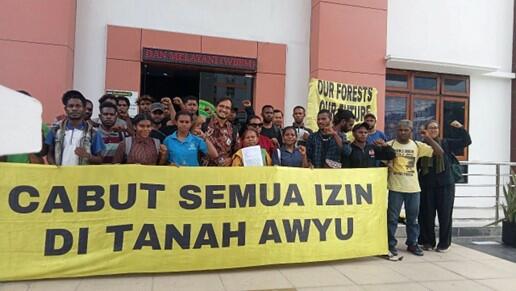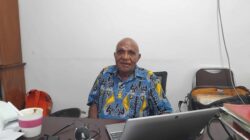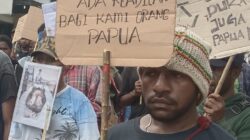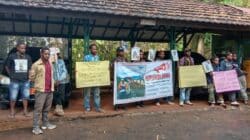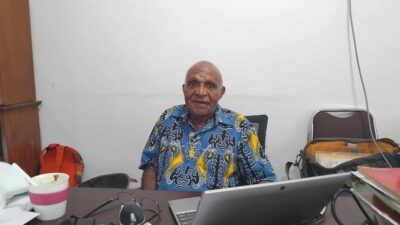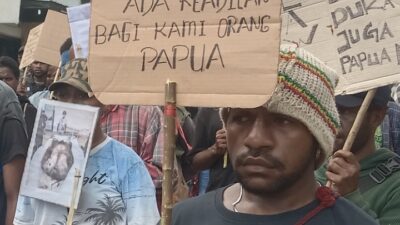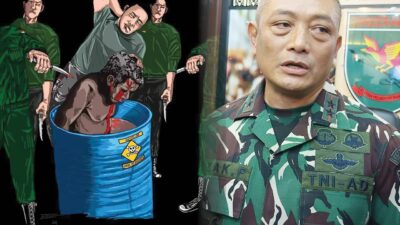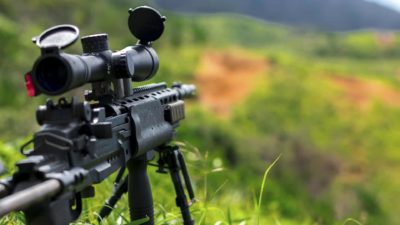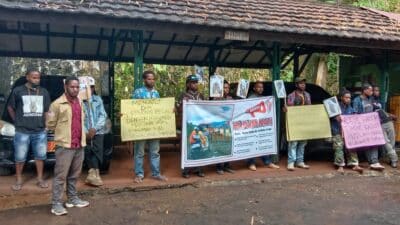Jayapura, Jubi – The Papua Legal Aid Institute (LBH Papua) has urged the judge of the Manado State Administrative High Court to overturn the decision of the Jayapura State Administrative Court, which dismissed the lawsuit of the Awyu Tribe community. This is crucial to safeguard the rights of the Awyu Tribe as indigenous people who have lost their customary land due to oil palm plantations.
“The Manado High Court judge must annul the Jayapura Court decision in order to protect the rights to ancestral land of the Awyu Tribe,” said LBH Papua Director Emanuel Gobay in Jayapura City on Tuesday (20/2/2024).
The case concerns the environmental feasibility permit issued by the Papua Provincial Office for Investment and Integrated One-Stop Service for the oil palm plantation of PT Indo Asiana Lestari or PT IAL. The permit challenged by the Awyu indigenous community includes plans to develop a 36,096.4-hectare oil palm plantation in Mandobo District and Fofi District, Boven Digoel Regency, South Papua Province. The Awyu indigenous community, as the plaintiff, stated that the permit was issued without their knowledge.
On November 2, 2023, a panel of judges led by Merna Cinthia along with associate judges Yusup Klemen and Donny Poja declared the lawsuit of the Awyu indigenous community groundless and dismissed it. On November 22, the Coalition Team for the Protection of Papua’s Customary Forests, acting as legal advisors to the Awyu indigenous community, filed an appeal to the Manado High Court.
Gobay stated that the examination of environmental cases in administrative courts as well as general courts has its mechanisms regulated in the Supreme Court Regulation No. 1/2023 on Guidelines for Adjudicating Environmental Cases. Gobay criticized the panel of judges of the Jayapura State Administrative Court for disregarding these mechanisms when examining and adjudicating the lawsuit of the Awyu indigenous community.
“The Decision Letter of the Papua Provincial Office for Investment and Integrated One-Stop Service for the oil palm plantation of PT Indo Asiana Lestari is an administrative decision of the government. The panel of judges should have followed the mandate of Article 26 of the Supreme Court Regulation in conducting the case examination,” he said.
The panel of judges rejecting the lawsuit on the grounds that the issuance of the permit followed a letter of support for oil palm plantation investment from the Customary Community Institution (LMA) of Boven Digoel Regency Number 30/LMA-BVD/VIII/2018 dated August 29, 2018, are unacceptable according to Gobay. He deemed these grounds irrelevant to the substance of the case and contrary to the mandate of providing customary land and individual land of indigenous people for any purpose.
“This has demonstrated that the panel of judges also committed violations of human rights, especially regarding the cultural identity of indigenous communities, including the protected rights to ancestral land as regulated in Article 6 paragraph (2) of Law No. 39/1999 concerning Human Rights,” he said.
On that basis, LBH Papua requests the Manado State Administrative High Court judge to annul the decision of the Jayapura State Administrative Court. LBH Papua also requests the Chief Justice of the Supreme Court to review the panel of judges examining the case at the Jayapura State Administrative Court. LBH Papua also requests the Judicial Commission to monitor Manado’s judges in their appeal process. (*)


